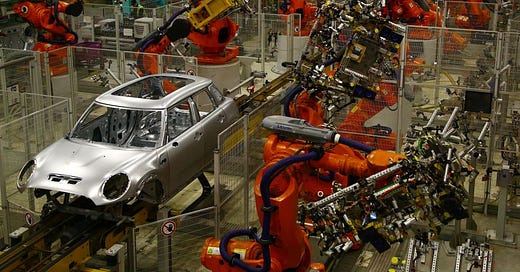Hello and welcome to the latest Off to Lunch….
The long-term future of one of the UK’s largest car factories has been secured. BMW has announced it will invest more than £600 million into modernising the Mini factory in Oxford so it can make electric cars.
The future of the Oxford factory has been in doubt because BMW, which owns Mini, had refused to commit to where it would manufacture a new generation of Minis.
However, the new investment means that the Oxford plant will make the all-electric Mini Cooper 3-door and the “compact crossover” Mini Aceman from 2026. The factory will be solely focused on electric vehicles from 2030.
The UK government has agreed to contribute £75 million of taxpayer funds to upgrading the Oxford factory, according to reports. The investment by BMW and the the government secures the future of around 4,000 jobs, including at the factory in Oxford but also at at Mini factory in Swindon that supplies metals for the cars.
Rishi Sunak, the prime minister, said:
“BMW’s investment is another shining example of how the UK is the best place to build cars of the future.
“By backing our car manufacturing industry, we are securing thousands of jobs and growing our economy right across the country.”
The announcement about the Mini factory comes just weeks after Jaguar Land Rover committed to building a gigafactory for batteries in Somerset. Nissan is also investing in its Sunderland factory, the largest car plant in the UK, while Ford and Stellantis, the owner of Vauxhall, are upgrading their UK facilities too.
But while this is undoubtedly positive news, the UK is still trying to encourage car makers to open new facilities in the country, not just secure the future of existing factories. The Mini factory in Oxford will import batteries from outside the UK for use in the vehicles.
Nonetheless, to give you a sense of the importance of the Oxford factory to the UK car industry, this graphic from the Society of Motor Manufacturers and Traders shows how many cars were made in the country in 2022 by brand and model. Mini is right up there…
Here is some of the reaction to the news about the Oxford factory…
For more on this story you can find BMW’s statement here, the government’s statement here and the data on the UK car industry from the SMMT here. I also recommend checking out the video below for more about the history of the Mini and John Cooper Works…
Other stories that matter…
1. The Liverpool One shopping centre wants retailers to close their doors to cut the use of heating and air conditioning. However, some of the shops don’t even have doors because they want to be as welcoming as possible to customers. Story from TheBusinessDesk.com here
2. The historian Niall Ferguson has written in his latest Bloomberg column that an economic cold war between the US and China would mean “mutually assured financial destruction”. Piece here
3. The Financial Times has looked at whether BAE System’s strong performance (its order-book is full for the next 30 years) can boost investment in Barrow-in-Furness, the Cumbrian town where it builds nuclear submarines and employs 12,000 people. Barrow’s productivity is above the UK average but the town is one of the most financially deprived in the UK and is still recovering from job losses over the last 20 years. BAE is working with the local authorities and the UK government on plans for Barrow, with the company wanting to attract workers to the area. You can read the feature here
4. An interesting piece from investment analyst Stephen Clapham on the sleepless nights he had as a sell-side analyst after making big calls on whether to buy or sell shares in a company. “I improved my skills the hard way – by spending over 20 years in the trenches, making mistakes and learning from them,” he writes. You can read the piece here
5. New Zealand lost their opening game of the Rugby World Cup to France, the first time they have ever lost a game in the opening group stage of the competition. The Economist has looked at what lessons can be learned from New Zealand’s slide from the team that dominated the 2011 and 2015 World Cups to the 2023 version, which may still win this World Cup but is clearly weaker. The issues identified by The Economist include management, fewer players to pick from and rivals catching up. Piece here
And finally…
Off to Lunch’s Sunday press review rounds up the important and interesting business coverage in the weekend papers and is sent to paying subscribers on a Sunday. This week’s edition included a look at Sir Pascal Soriot’s future at AstraZeneca, Qatari investment in UK science, and features on the bizarre Manchester United takeover saga and the collapse of Lehman Brothers 15 years on. You can sign-up to read this week’s edition and get all future Sunday press reviews here. It is just £6-a-month or £50-a-year to be an Off to Lunch subscriber.
Thanks for reading. If you enjoy Off to Lunch then please share it with others and spread the word. If this newsletter was shared with you then please sign-up below to become a member, get Off to Lunch sent directly to your inbox, and contribute to the work of Off to Lunch
Best
Graham









